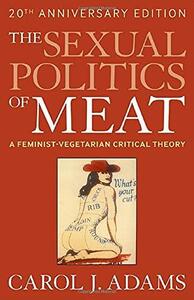You need to sign in or sign up before continuing.
Take a photo of a barcode or cover
194 reviews for:
The Sexual Politics of Meat (20th Anniversary Edition): A Feminist-Vegetarian Critical Theory
Carol J. Adams
194 reviews for:
The Sexual Politics of Meat (20th Anniversary Edition): A Feminist-Vegetarian Critical Theory
Carol J. Adams
The New York Times runs an essay contest on the ethics of meat eating. The judges are animal rights advocates and plant-based nutrition gurus. They are all men.
Carol J. Adams wrote "The Sexual Politics of Ethics" and questioned the choice of an all male panel. Why wasn't a single female included (Karen Davis, Pattrice Jones, Lauren Ornelas, Erica Meier, Josephine Donovan, Greta Gaard, Lori Gruen, Marla Rose, Laura Wright, Kim Socha, Breeze Harper, Jasmin Singer or Mariann Sullivan for example)?
Why not Carol J. Adams?
I looked up from the article. A lot of my own animal rights and plant-based diet role models and heroes are men. Wait, all men. And I hadn't heard of most of these women. Uh oh.
There are some thoughtful ideas about "What’s Wrong with Only White Men Judging a Contest Defending Meat-Eating?"
But the source of my "uh oh" was discomfiting de ja vu — when I'm not reading the women I'm missing out.
I bought the 20th Anniversary Edition of The Sexual Politics of Meat: A Feminist-Vegetarian Critical Theory and started reading. There are three prefaces — to the original book (1990), to the 10th anniversary edition, and to the 20th edition — and a foreword before the actual book begins.
The book describes the intersection between feminism, pacifism and vegetarianism (conversely male dominance, war, and meat-eating).
The early chapters such as, "The Rape of Animals, the Butchering of Women," link the consumption of animals and women. They are painful reading. Adams draws attention to gut-churning abuses that mirror modern news headlines i.e. Georgia Republican Compares Women to Cows, Pigs, And Chickens (His thinking: Pigs must carry dead fetuses to term and so must women. Sad, but that's life. Abortion is unethical).
It's reading a book about an atrocity during the atrocity — reading about the dystopia you inhabit.
When I read news like this I think, "We shouldn't treat animals like that either." and "If we raised the bar for how we treat animals, we'd treat ourselves better."
This idea of including animals "within the moral circle of consideration" is part of a vegetarian body of thought and literature. Vegetarians have been expressing this idea before the word vegetarian was coined in 1847 (They were called Pythagoreans before. The followers of Pythagoras had religious and ethical beliefs including metempsychosis, the transmigration of souls into the bodies of other animals, which excluded the eating of animals).
Adams dives into this discussion in the middle of the book and the chapter "The Word Made Flesh" where she talks about how, "Meat eating is a story applied to animals, it gives meaning to animals' existence." and the alternate vegetarian narrative. Instead of a hero's journey, she describes a "vegetarian quest" wherein dietary choices conflict with the dominant culture.
By the final chapters, I was wildly adding to my to-read list. In the last chapter, "Feminist-Vegetarian Critical Theory," Adams lists numerous works of fiction with feminist-vegetarian themes.
The book ends on a utopian note, "Feminist-vegetarian activity declares that an alternative worldview exists, one which celebrates life rather than consuming death; one which does not rely on resurrected animals but empowered people." and with a call for the "creation of vegetarian rituals that celebrate the grace of eating plants" and help counter patriarchal consumption.
Of note, some feminist science fiction and utopian connections: the chapter "Frankenstein's Vegetarian Monster" explores the Creature's vegetarianism and notes other works by Romantic vegetarians including Percy Shelley's Queen Mab (arguably the first feminist, vegetarian, pacifist Utopia, Adams says)
Fact: the average American eats 43 pigs, three lambs, 11 cows, four calves, 2,555 chickens and turkeys and 861 fishes in a lifetime
Pairs well with: Upton Sinclair's The Jungle; Percy Shelley's Queen Mab; Mary Shelley's Frankenstein; "Eat Rice Have Faith in Women," Fran Winart
Quotes:
"It's a difficult task, o citizens, to make speeches to the belly which has no ears." — Cato
"The men were better hunters than the women, but only because the women had found that they could live quite well on foods other than meats. — Alice Walker, The Temple of My Familiar
"[The slaughterhouse] carries out its business in secret and decides what you will see, hides from you what it chooses." — Richard Selzer
"If the words which tell the truth about meat as food are unfit for our ears, the meat itself is not fit for our mouths." — Emarel Freshel
"As long as man kills the lower races for food or sport, he will be ready to kill his own race for enmity. It is not this bloodshed or that bloodshed, that must cease, but all needless bloodshed — all wanton infliction of pain or death upon our fellow beings." — Henry Salt
"May the fairies be vegetarian!" — Judy Grahn, "The Queen of Swords"
Carol J. Adams wrote "The Sexual Politics of Ethics" and questioned the choice of an all male panel. Why wasn't a single female included (Karen Davis, Pattrice Jones, Lauren Ornelas, Erica Meier, Josephine Donovan, Greta Gaard, Lori Gruen, Marla Rose, Laura Wright, Kim Socha, Breeze Harper, Jasmin Singer or Mariann Sullivan for example)?
Why not Carol J. Adams?
I looked up from the article. A lot of my own animal rights and plant-based diet role models and heroes are men. Wait, all men. And I hadn't heard of most of these women. Uh oh.
There are some thoughtful ideas about "What’s Wrong with Only White Men Judging a Contest Defending Meat-Eating?"
But the source of my "uh oh" was discomfiting de ja vu — when I'm not reading the women I'm missing out.
I bought the 20th Anniversary Edition of The Sexual Politics of Meat: A Feminist-Vegetarian Critical Theory and started reading. There are three prefaces — to the original book (1990), to the 10th anniversary edition, and to the 20th edition — and a foreword before the actual book begins.
The book describes the intersection between feminism, pacifism and vegetarianism (conversely male dominance, war, and meat-eating).
The early chapters such as, "The Rape of Animals, the Butchering of Women," link the consumption of animals and women. They are painful reading. Adams draws attention to gut-churning abuses that mirror modern news headlines i.e. Georgia Republican Compares Women to Cows, Pigs, And Chickens (His thinking: Pigs must carry dead fetuses to term and so must women. Sad, but that's life. Abortion is unethical).
It's reading a book about an atrocity during the atrocity — reading about the dystopia you inhabit.
When I read news like this I think, "We shouldn't treat animals like that either." and "If we raised the bar for how we treat animals, we'd treat ourselves better."
This idea of including animals "within the moral circle of consideration" is part of a vegetarian body of thought and literature. Vegetarians have been expressing this idea before the word vegetarian was coined in 1847 (They were called Pythagoreans before. The followers of Pythagoras had religious and ethical beliefs including metempsychosis, the transmigration of souls into the bodies of other animals, which excluded the eating of animals).
Adams dives into this discussion in the middle of the book and the chapter "The Word Made Flesh" where she talks about how, "Meat eating is a story applied to animals, it gives meaning to animals' existence." and the alternate vegetarian narrative. Instead of a hero's journey, she describes a "vegetarian quest" wherein dietary choices conflict with the dominant culture.
By the final chapters, I was wildly adding to my to-read list. In the last chapter, "Feminist-Vegetarian Critical Theory," Adams lists numerous works of fiction with feminist-vegetarian themes.
The book ends on a utopian note, "Feminist-vegetarian activity declares that an alternative worldview exists, one which celebrates life rather than consuming death; one which does not rely on resurrected animals but empowered people." and with a call for the "creation of vegetarian rituals that celebrate the grace of eating plants" and help counter patriarchal consumption.
Of note, some feminist science fiction and utopian connections: the chapter "Frankenstein's Vegetarian Monster" explores the Creature's vegetarianism and notes other works by Romantic vegetarians including Percy Shelley's Queen Mab (arguably the first feminist, vegetarian, pacifist Utopia, Adams says)
Fact: the average American eats 43 pigs, three lambs, 11 cows, four calves, 2,555 chickens and turkeys and 861 fishes in a lifetime
Pairs well with: Upton Sinclair's The Jungle; Percy Shelley's Queen Mab; Mary Shelley's Frankenstein; "Eat Rice Have Faith in Women," Fran Winart
Quotes:
"It's a difficult task, o citizens, to make speeches to the belly which has no ears." — Cato
"The men were better hunters than the women, but only because the women had found that they could live quite well on foods other than meats. — Alice Walker, The Temple of My Familiar
"[The slaughterhouse] carries out its business in secret and decides what you will see, hides from you what it chooses." — Richard Selzer
"If the words which tell the truth about meat as food are unfit for our ears, the meat itself is not fit for our mouths." — Emarel Freshel
"As long as man kills the lower races for food or sport, he will be ready to kill his own race for enmity. It is not this bloodshed or that bloodshed, that must cease, but all needless bloodshed — all wanton infliction of pain or death upon our fellow beings." — Henry Salt
"May the fairies be vegetarian!" — Judy Grahn, "The Queen of Swords"
I especially recommend the anniversary edition with helpful prefaces by Adams looking back on her work. This is a classic. Everyone writing about animals cites it, as they should. It isn't without theoretical problems, but it was a game changer, and it is still compelling. Highly recommend.
’Theory’ is a word that is written in large font in the cover The Sexual Politics of Meat yet I still wasn’t prepared to how theoretical the book would be. Longwinded examples and deep analyzes of even the weak connections made this slightly tedious to read, even though I found the main message, the connection between vegetarism and feminism, fascinating. It’s a connection that I now understand much better than before but I wish I could have gotten the same knowledge through a different form. My field is in natural sciences; I’m not used to reading theories like this.
”Everywhere animals are in chains, but we imagine them as free. This denial is very strong. To convey this sense of the animals’ freedom, patriarchal-cultural images draw upon cues about another supposed freedom: the consumption of women’s sexuality. Thus animals and women are not only depicted as free, though they are not, but as sexually free. The result is the sexual politics of meat.”
”Everywhere animals are in chains, but we imagine them as free. This denial is very strong. To convey this sense of the animals’ freedom, patriarchal-cultural images draw upon cues about another supposed freedom: the consumption of women’s sexuality. Thus animals and women are not only depicted as free, though they are not, but as sexually free. The result is the sexual politics of meat.”
challenging
dark
informative
inspiring
reflective
slow-paced
incredibly wide range of topics and detailed discussions of the link between sexism/the patriarchy and meat consumption/the meat industry and everything adjacent or in-between (and i really mean that).
an insanely referential and intertextual book; i don't think i have ever highlighted and bookmarked this much, much less noted so many sources to read next.
carol j. adams manages to not just explain what's promised by the title, but paints a full picture of our cultural landscape. her advocacy for veganism/vegetarianism turns out to be less of an "addition" to feminist liberation and much more a byproduct or even a stepping stone for getting back in touch with humanity.
while this book is a lot to chew, and exactly because of this, the slow pace and thoroughness of the text hands the reader the tools to recognize the sexual politics of meat themselves now too!
to quote a reader of the sexual politics of meat, mentioned in the afterword of 25th anniversary edition, i will say that “Before reading it [The Sexual Politics of Meat], this ad would’ve annoyed me, but I would not have been able to point out precisely why, nor would I have seen this as a symptom of the culture I live in. Or that this kind of visual language is hurtful to everyone, no matter their gender or sex.”
i'd recommend at least looking through the foreword, to see if any of the mentioned upcoming topics catch your interest, to anyone who's at least a bit curious about what this book entails!
an insanely referential and intertextual book; i don't think i have ever highlighted and bookmarked this much, much less noted so many sources to read next.
carol j. adams manages to not just explain what's promised by the title, but paints a full picture of our cultural landscape. her advocacy for veganism/vegetarianism turns out to be less of an "addition" to feminist liberation and much more a byproduct or even a stepping stone for getting back in touch with humanity.
while this book is a lot to chew, and exactly because of this, the slow pace and thoroughness of the text hands the reader the tools to recognize the sexual politics of meat themselves now too!
to quote a reader of the sexual politics of meat, mentioned in the afterword of 25th anniversary edition, i will say that “Before reading it [The Sexual Politics of Meat], this ad would’ve annoyed me, but I would not have been able to point out precisely why, nor would I have seen this as a symptom of the culture I live in. Or that this kind of visual language is hurtful to everyone, no matter their gender or sex.”
i'd recommend at least looking through the foreword, to see if any of the mentioned upcoming topics catch your interest, to anyone who's at least a bit curious about what this book entails!
So many thoughts about this. The main takeaway: any “othering” of another living being (women, animals, someone different than you) is a slippery slope to violence. Adams identifies this in a model of Objectification-Fragmentation-Consumption. We objectify the “other” which excuses violence against them. The presence of any violence is linked to *all* violence. So, it’s worth questioning why we are so comfortable with violence against animals (and against women, for that matter).
On a less serious note, it’s funny how defensive men get when you try to take away their meat.
On a less serious note, it’s funny how defensive men get when you try to take away their meat.
This should be required reading for all feminists, their allies and anyone who wishes to understand why there is so much violence in the world.
This book informed both my vegetarian and feminist political views. It strengthened my resolve to eat mindfully and battle the patriarchy!
“Che cos’è la “politica sessuale della carne”? È un’attitudine e una prassi che animalizza le donne e sessualizza e femminilizza gli animali.”
Carne da macello è un saggio da leggere assolutamente.
Offre una panoramica su come la cultura della carne o la “politica sessuale della carne” condizioni la nostra vita e sia strettamente legata al maschilismo.
Quante volte è capitato di vedere pubblicità che sessualizzano le donne solo per attirare lo sguardo maschile? Per di più in pubblicità che riguardano la carne, da sempre considerato pasto maschile.
Trovate, sfortunatamente, moltissimi esempi all’interno del saggio descritti anche con l’aiuto di immagini.
La prima parte si struttura come saggio e qui ho trovato davvero interessante vedere come il vegetarianismo fosse di così legato al femminismo.
La seconda parte tratta della presenza del vegetarianismo nella letteratura, e ho letto con molto interesse il capitolo dedicato a Frankestein.
“Il vegetarianismo della Creatura non conferma solo la sua bontà intrinseca e originale,ma esprime la precisa ricostruzione dei temi articolati da un gruppo di suoi contemporanei che io definisco “vegetariani romantici”. “
È un saggio che consiglio moltissimo, sia per avvicinarsi al tema sia per informarsi su quanto in realtà siamo condizionati da questa politica della carne.
Carne da macello è un saggio da leggere assolutamente.
Offre una panoramica su come la cultura della carne o la “politica sessuale della carne” condizioni la nostra vita e sia strettamente legata al maschilismo.
Quante volte è capitato di vedere pubblicità che sessualizzano le donne solo per attirare lo sguardo maschile? Per di più in pubblicità che riguardano la carne, da sempre considerato pasto maschile.
Trovate, sfortunatamente, moltissimi esempi all’interno del saggio descritti anche con l’aiuto di immagini.
La prima parte si struttura come saggio e qui ho trovato davvero interessante vedere come il vegetarianismo fosse di così legato al femminismo.
La seconda parte tratta della presenza del vegetarianismo nella letteratura, e ho letto con molto interesse il capitolo dedicato a Frankestein.
“Il vegetarianismo della Creatura non conferma solo la sua bontà intrinseca e originale,ma esprime la precisa ricostruzione dei temi articolati da un gruppo di suoi contemporanei che io definisco “vegetariani romantici”. “
È un saggio che consiglio moltissimo, sia per avvicinarsi al tema sia per informarsi su quanto in realtà siamo condizionati da questa politica della carne.
a lot of this went over my head but i’ll def be listening again
slow-paced







